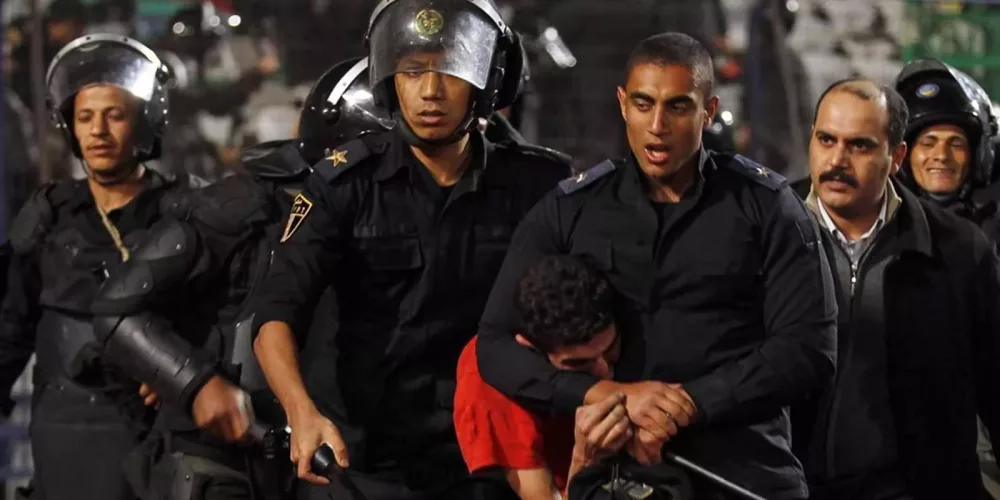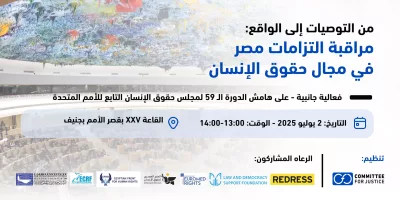The Committee for Justice (CFJ) stated that its cooperation with UN mechanisms aims to present an accurate picture of the human rights situation in Egypt to these mechanisms and the international community. CFJ clarified that this cooperation helps UN mechanisms respond to human rights violations in Egypt by issuing reports condemning such violations and decisions demanding their cessation. These mechanisms also work to encourage Egyptian authorities to comply with international and UN treaties they have signed, which, if the authorities respond positively, could lead to improvements in the country’s human rights situation and enhance respect for human rights more effectively.
– State of Emergency:
This comes in conjunction with the publication by the United Nations Committee against Torture of a follow-up report submitted by the Egyptian authorities confirming the end of the state of emergency in October 2021. They asserted that it had been imposed solely to address legitimate security threats, particularly terrorism. The authorities explained that the Emergency Law was applied in accordance with the Egyptian Constitution and validated by the Supreme Constitutional Court, provided it was used under strict conditions that respect international commitments. The government also claimed that the emergency period included several safeguards, such as prohibiting arbitrary detention and ensuring detainees could communicate with legal counsel.
However, CFJ countered these claims in its report, asserting that the end of the state of emergency has not resulted in tangible improvements in the human rights situation. Despite its official termination, the authorities continue to use other laws, such as the Anti-Terrorism Law and the Criminal Procedure Code, to suppress activists and political opponents. CFJ’s report highlighted the absence of effective judicial oversight, which has perpetuated arbitrary detention and incarceration without fair trials, indicating that the state of emergency remains effectively in place unofficially.
– Detention Conditions:
Regarding detention conditions, Egyptian authorities claimed in their report to have reformed the prison system, citing the establishment of new facilities, such as the Wadi El-Natrun and Badr rehabilitation and correctional centers, which they said comply with the “Nelson Mandela Rules” for the treatment of prisoners. They also stated that they had proposed legislative reforms, including a draft law on criminal procedures aimed at reducing pretrial detention periods and promoting alternatives to incarceration, such as conditional release and house arrest.
In contrast, CFJ reported that the reality inside Egyptian prisons remains dire. Despite the opening of new facilities, prisons continue to suffer from overcrowding, mistreatment, and the denial of medical care. CFJ documented over 1,275 deaths in custody since 2013, most due to deliberate medical neglect. Additionally, CFJ noted that the alternative measures promoted by the authorities are not effectively implemented, and the announced legislative reforms have yet to be genuinely enacted.
– Death Penalty:
Concerning the death penalty, Egyptian authorities asserted that it is applied only for the most serious crimes, such as terrorism and premeditated murder, and that all death sentences are reviewed by the Court of Cassation to ensure fair trials. They emphasized that the application of this penalty takes cultural and societal contexts into account to achieve justice.
However, CFJ criticized these claims, highlighting the excessive use of the death penalty in Egypt, particularly against political opponents. CFJ explained that trials leading to death sentences often lack fairness and transparency, frequently relying on confessions obtained through torture. The organization called on Egyptian authorities to restrict the death penalty to the most serious crimes in line with international standards and to ensure transparency and independent review for all cases.
– Legislative Reforms:
Regarding legislative reforms, Egyptian authorities stated that they had introduced a new draft law on criminal procedures aimed at modernizing the legal system and enhancing justice. The draft law purportedly includes measures to reduce pretrial detention periods, provide alternatives to incarceration, and compensate individuals proven innocent.
However, CFJ expressed significant concerns about this draft law, noting that it grants the Public Prosecution extensive powers at the expense of judicial independence, enabling prolonged detention without adequate safeguards. CFJ also highlighted that the draft law lacks mechanisms to ensure fair trials and does not address the excessive protection afforded to government officials from accountability, rendering it incompatible with international standards.
– Prisoner Releases:
Finally, regarding prisoner releases, Egyptian authorities claimed to have released some detainees on health grounds under Article 36 of the Prison Regulation Law and cited the use of presidential pardons to reduce overcrowding and improve prisoners’ conditions.
CFJ, however, argued that these efforts have been insufficient. Overcrowding remains a significant issue, and health-related releases have been limited to very few cases, failing to reflect a substantive shift in detention policies. CFJ also pointed out that many released detainees suffer from severe health conditions caused by mistreatment and neglect during detention.
CFJ emphasizes the importance of continued cooperation with UN mechanisms to highlight human rights violations in Egypt and maintain pressure on the government to reform its policies in line with international commitments. CFJ urges Egyptian authorities to take concrete steps to improve the human rights situation, including a comprehensive review of laws and security measures, ensuring judicial independence, refraining from using violence to suppress dissent, and implementing the recommendations outlined in the UN Committee Against Torture’s follow-up report.






